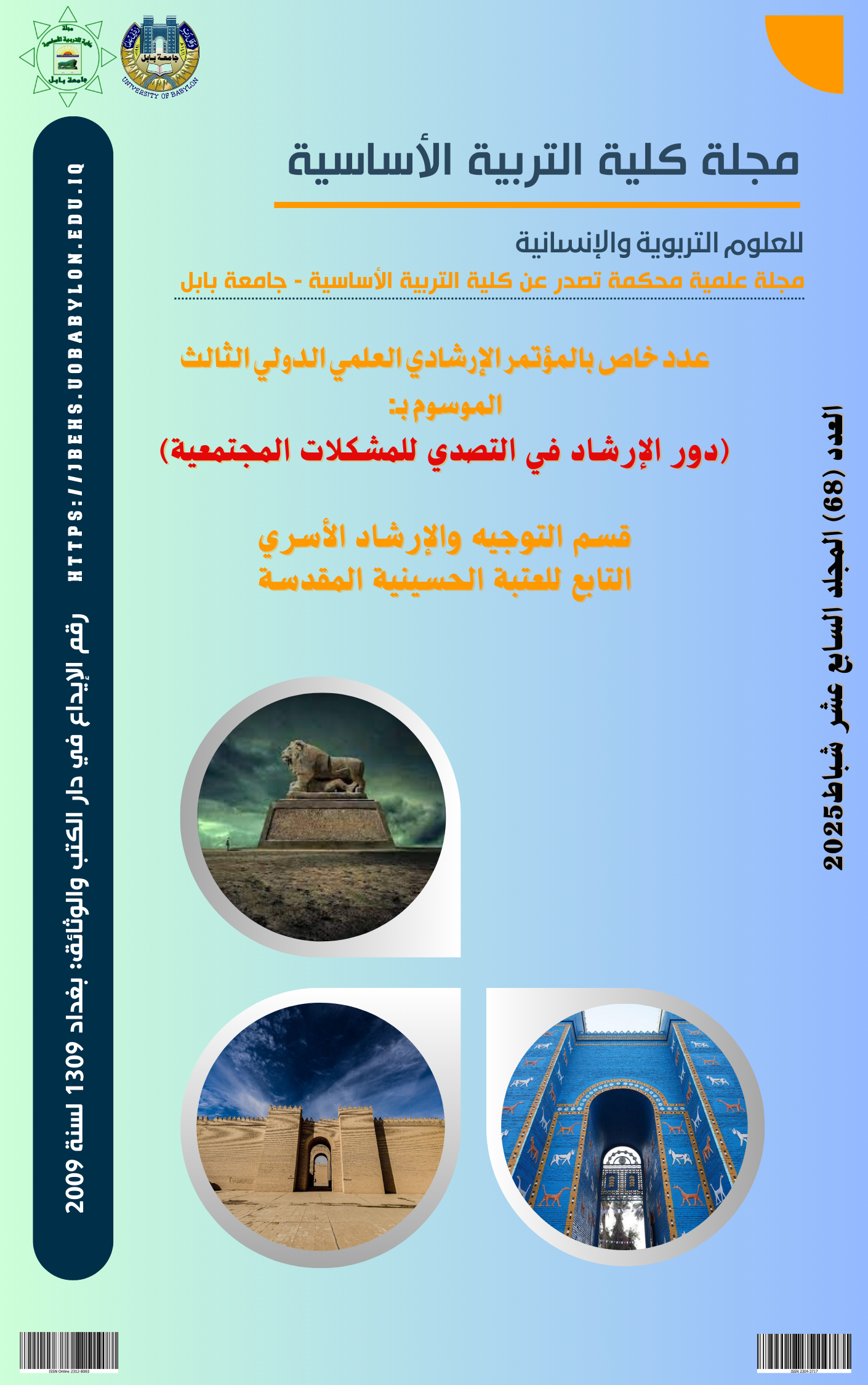Abstract
The current research aims to identify emotional infidelity and family conflicts among married people, the nature of the correlation between emotional infidelity and family conflicts among married people, and the statistically significant differences in the correlation between emotional infidelity and family conflicts among married people, according to the variable gender (males - females), duration of marriage (less than five years - more than five years), type of marriage (mandatory - optional). The descriptive correlational approach was used, and two scales were built, the first to measure emotional infidelity, and the second to measure family conflicts. After confirming the psychometric properties of the two scales, they were applied to a sample of (400) married men and women. After processing the data using appropriate statistical methods, the results showed the following:
- The sample members have a high level of (emotional infidelity) and (family conflicts).
- There is a direct (positive) correlation between emotional infidelity and family conflicts, the more emotional infidelity increases, the more family conflicts, and the less emotional infidelity decreases, the less family conflicts.
- There are statistically significant differences in the correlation between emotional infidelity and family conflicts according to the gender variable and in favor of males, i.e. married men are more emotionally infidel than married women, and according to the variable of the number of years of marriage, in favor of a period of more than five years. While there are no statistically significant differences according to the type of marriage. In light of the results of the current research, a set of conclusions, recommendations and proposals were developed.
- The sample members have a high level of (emotional infidelity) and (family conflicts).
- There is a direct (positive) correlation between emotional infidelity and family conflicts, the more emotional infidelity increases, the more family conflicts, and the less emotional infidelity decreases, the less family conflicts.
- There are statistically significant differences in the correlation between emotional infidelity and family conflicts according to the gender variable and in favor of males, i.e. married men are more emotionally infidel than married women, and according to the variable of the number of years of marriage, in favor of a period of more than five years. While there are no statistically significant differences according to the type of marriage. In light of the results of the current research, a set of conclusions, recommendations and proposals were developed.
Keywords
Emotional Infidelity
Family Conflicts
married people.
Abstract
يستهدف البحث الحالي التعرف على الخيانة العاطفية والصراعات الأسرية لدى المتزوجين، وطبيعة العلاقة الارتباطية بين الخيانة العاطفية والصراعات الأسرية لدى المتزوجين، والفروق ذات الدلالة الاحصائية في العلاقة الارتباطية بين الخيانة العاطفية والصراعات الأسرية لدى المتزوجين، تبعاً للمتغير الجنس (ذكور- إناث)، مدة الزواج (أقل من خمس سنوات- أكثر من خمس سنوات)، نوع الزواج (إجباري- اختياري). تمَّ استعمال المنهج الوصفي الارتباطي، وبناء مقياسين الأول لقياس الخيانة العاطفية، والثاني لقياس الصراعات الأسرية، وبعد التأكد من الخصائص السايكومترية للمقياسين تمَّ تطبيقهما على عينة متكونة من (400) متزوجٍ ومتزوجةٍ، وبعد معالجة البيانات بالوسائل الاحصائية المناسبة أظهرت نتائج البحث ما يأتي:
- إنَّ أفراد العينة لديهم مستوى مرتفع من (الخيانة العاطفية) و(الصراعات الأسرية).
- وجود علاقة ارتباطية طردية (موجبة) بين الخيانة العاطفية والصراعات الأسرية، كلما ازدادت الخيانة العاطفية ازدادت الصراعات الأسرية وكلما قلت الخيانة العاطفية قلت الصراعات الأسرية.
- وجود فروق ذات دلالة احصائية العلاقة الارتباطية بين الخيانة العاطفية والصراعات الأسرية على وفق متغير الجنس ولصالح الذكور، أي أن المتزوجين الذكور أكثر خيانة عاطفية من المتزوجات الإناث، وعلى وفق متغير مدة سنوات الزواج، ولصالح مدة الأكثر من خمس سنوات. بينما لا توجد فروق ذات دلالة احصائية على وفق نوع الزواج. وفي ضوء نتائج البحث الحالي تمّ وضع مجموعة من الاستنتاجات والتوصيات والمقترحات.
- إنَّ أفراد العينة لديهم مستوى مرتفع من (الخيانة العاطفية) و(الصراعات الأسرية).
- وجود علاقة ارتباطية طردية (موجبة) بين الخيانة العاطفية والصراعات الأسرية، كلما ازدادت الخيانة العاطفية ازدادت الصراعات الأسرية وكلما قلت الخيانة العاطفية قلت الصراعات الأسرية.
- وجود فروق ذات دلالة احصائية العلاقة الارتباطية بين الخيانة العاطفية والصراعات الأسرية على وفق متغير الجنس ولصالح الذكور، أي أن المتزوجين الذكور أكثر خيانة عاطفية من المتزوجات الإناث، وعلى وفق متغير مدة سنوات الزواج، ولصالح مدة الأكثر من خمس سنوات. بينما لا توجد فروق ذات دلالة احصائية على وفق نوع الزواج. وفي ضوء نتائج البحث الحالي تمّ وضع مجموعة من الاستنتاجات والتوصيات والمقترحات.
Keywords
الخيانة العاطفية، الصراعات الأسرية، المتزوجين.
